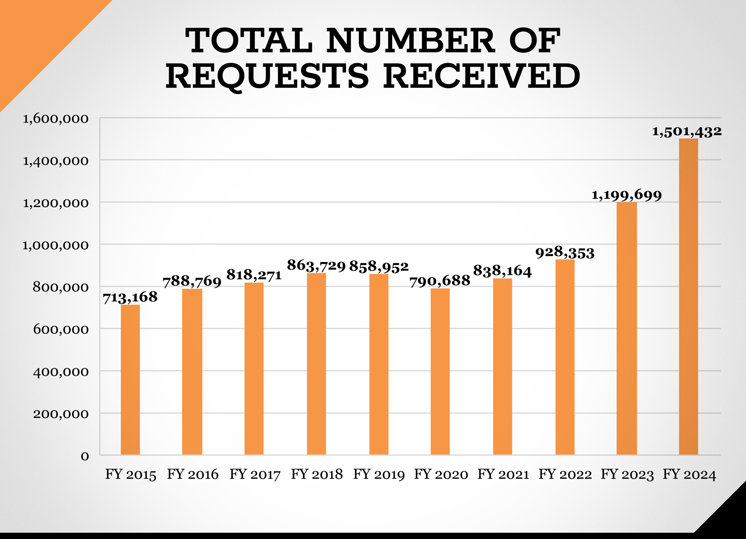On the one hand, the “rock” is the quantity of Freedom of Information Act (FOIA) requests flooding in to the federal government, which hit an all-time high in 2024, threatening to cause monumental slowdowns in the furnishing of information.
The “hard place”? Simultaneously, massive federal staff cutbacks have decimated the number of researchers assigned to processing FOIA requests.
“The records that are of public interest will remain undisclosed and for longer periods.”
So while FOIA requests are pouring in at record levels, who’s left to handle them?
And how can the unprecedented volume of requests possibly be processed in a timely and efficient manner?
You have to wonder.
In rounding up the number of FOIA requests received by various federal agencies, the Office of Information Policy discovered that, in 2024, there were 1,501,432 requests—a 25 percent increase over 2023.
The Department of Homeland Security, the Department of Defense, the Department of Justice, the Department of Veterans Affairs and the Department of Health and Human Services processed 85 percent of the total number of requests.

Federal agencies handled 1,499,265 requests overall, leaving over 267,000 requests unprocessed.
And that’s before recent staff cutbacks.
“The records that are of public interest will remain undisclosed and for longer periods,” attorney Allan Blutstein of FOIA Advisor said. “I suspect what staff remains is likely to be focused on litigation because it’s much easier to ignore a FOIA requester than a plaintiff in court. So unless your request is in litigation, you’ll be likely further back in the processing queue and the delays will just intensify.”
“It looks like the best case scenario is that there’s going to be a major slowdown in the processing of requests,” said attorney Michael Rothberg. Health and Human Services was “already backlogged, like many other agencies. [Staff cuts are] definitely going to worsen the situation.”
“They are the American people’s records, and there should be adequate FOIA staff to make sure that record requests are answered promptly,” said Jason R. Baron, former director of litigation at the National Archives and Records Administration.
FOIA, enacted in 1966, gives the public access to federal records. By statute, requests are to be answered within 20 working days. Given the current increase in requests and staff cutbacks, however, it’s unlikely this timeframe will be consistently met.
But agencies may find staff shortages no excuse for not promptly filling requests.
Federal district court judge Randolph Moss recently stated in a ruling: “In the present context, the Court is skeptical that an agency can avoid its obligations under FOIA—including the obligation to process a request in an efficient and prompt manner—by simply implementing a reduction-in-force.”
The Church of Scientology has long been a powerful advocate of FOIA and open, transparent government. Scientology Founder L. Ron Hubbard famously stated: “Democracy depends exclusively on the informedness of the individual citizen.”
As Gunita Singh, an attorney at the Reporters Committee for Freedom of the Press, put it: “FOIA is a law—not a mere suggestion.”






















